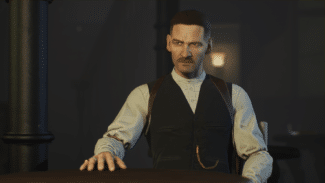Nearly three years on from its first release, Maze Theory is doubling down on VR.
After a few years away from the medium, expanding the initially VR-only Doctor Who: The Edge of Time into other versions for different platforms, the London-based studio is prepping the release of its next major VR title, Peaky Blinders: The King’s Ransom. At the same time, Maze Theory has hired 14 new staff, including developers from studios with VR experience like nDreams, Rebellion and Codemasters.
It’s also keen to push into the social VR space with its first multiplayer project, Engram (formerly The Vanishing Act). But why is now the right time to push further into uncharted waters? And what can we expect from the studio past the launch of Peaky Blinders VR? We spoke to Russell Harding, Chief Creative Officer, and Marcus Moresby, Creative Director, to find out more.
UploadVR: Why is now the right time for Maze Theory to expand its staff and VR operations?
Maze Theory: We’ve been really excited and encouraged to see the prolific expansion of the VR market. With platforms such as Pico Neo emerging and PSVR 2 on the way. Quest has been evolving new headsets and the VR experience is really having its moment, having lived through some hard times!
The socially connected experience within VR is also coming to the fore and it’s set to play a pivotal role in the future of the metaverse.
It’s the perfect time to invest in our team and broaden our portfolio of experiences. We want to capitalize on these opportunities. At Maze Theory, we’ve coined the phrase ‘Storyliving’ to describe our approach to gaming in VR. Never has there been a better time to develop this and watch it take root within the VR community!
UVR: We’ve seen the success of Quest lead to renewed interest in the VR market. As a developer, is your approach to be Quest-centric going forward or do you foresee new hardware that will be equally as important?
MT: Quest is very much the leading platform at the moment. So naturally we’ve been focused on finding the best way to make the most of that and ensure we can deliver the quality and experience the IP we work with – and develop – demands.
Now that PSVR 2 is on the horizon, it’s of huge interest and something we are working towards. It makes sense to keep exploring new platforms.
In addition to these two established formats, we are also very interested to see what impact Pico will have in the future.
UVR: Tell us more about Engram and the strive for original IP. Why is that important to you after close partnerships with the BBC and Banijay?
MT: It’s part of the studio’s intention to develop its own IP. We have amassed a huge amount of experience and learning from working with titles such as Peaky Blinders and Doctor Who. We want to use that experience to push the boundaries of VR. We have developed specialist knowledge and an incredible team, and an understanding of creating lore. It’s the natural next step to bring this to Engram and other projects that will be announced forthwith.
With Engram, we are also exploring the wealth of possibilities around multiplayer and social VR. The core premise of the game is exploring memories, and we’re working on ways to achieve a heightened range of emotional experiences.
We are not announcing a launch date for Engram at this stage. But we feel very excited about it! For us, it’s a symbol of exploration and experimentation within VR, as well as the creativity and aspiration that feeds into all of our games. Some of this will also spin off into other products and IP. It’s the ultimate expression of what Maze Theory is about.
UVR: Peaky Blinders and Doctor Who are single-player experiences. Why, with this experience, is it important for you to push into social VR in the future?
MT: Community-driven gaming and shared experiences are gaining traction and people are really enjoying this aspect. It means you can be in the story together and that makes it ultimately more powerful. That in itself changes the way we approach the development of the story. It’s an exciting proposition!
UVR: After the release of Doctor Who you turned to some flatscreen adaptations, presumably because VR is a tough market. Are you anticipating continuing flatscreen development considering VR’s momentum going forward?
MT: Within the Doctor Who universe, it was part of our remit to think about different ways of telling the story. So the multi-platform approach was more about delivering different types of experiences for fans. The community has a deep involvement in the IP, so they are drawn to crave Doctor Who stories told in different ways, across different windows and platforms.
Our dedicated focus on VR – at this point – is because that market has changed and grown. We’re still aiming to deliver in a space where fans can have the best experiences.







